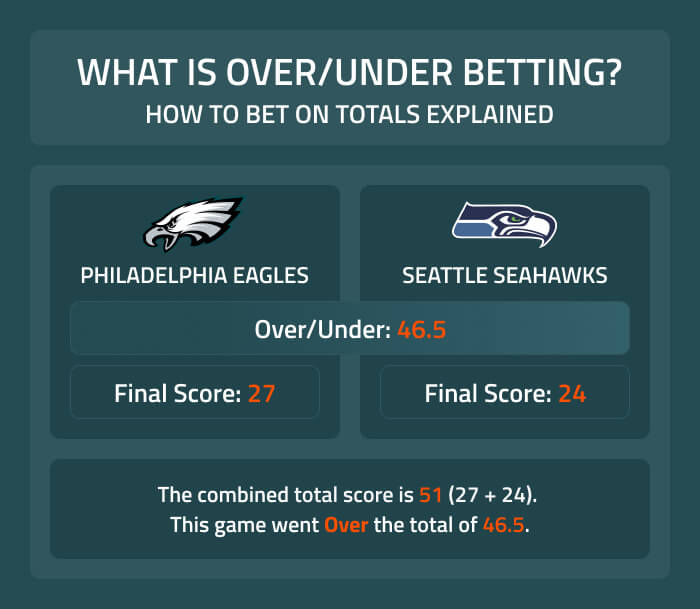Over Under Bet Example
- What Is Over Under Bet
- Over Under Bet Example Crossword Clue
- Over Under Bet Example Definition
- Understanding Over And Under Bets
I have to admit, I’m one of those sports fans who if I don’t know what something means, I have no shame in asking. Except when it comes to things that I should technically “already know”.
In this case, you are placing half a bet on over 2.0 and the other half on 2.5. If the total goal of the match is 2 goals, you win half your original bet (the other half is a push). If the total is more than 2 goals you lose the bet, and if it’s less than 2 goals you win the bet.
That is the problem that I continuously run into the problem of when I hear the terms “cover the spread” or “I’ll take the points”. I do what a lot of girls do, shake my head and smile to give off the perception that “yeah she knows what she’s talking about”.
Many girls feel somewhat afraid to ask questions when it comes to sports.
Usually they are laughed at for not knowing things that seem very simple to the avid sports fan. Avid fans seem to forget that you could spend dozens of years learning about so many rules, stats and the history of each sport and still not know everything.
But that’s also what makes sports so much fun to watch and learn.
I decided instead of asking someone what “covering the spread” means, I would just take the simple route: When it doubt, Google it. And I’m pretty sure, the search engine won’t be laughing at me!
Read on to find out what a point spread, covering the spread, against the spread and over/under mean….
- Even though Totals and Over/Under may be used interchangeably for scoring, there’s another way to make Over/Under bets. An Over/Under bet can also be a proposition bet where there’s a wager made on a specific occurrence. A boxing match is a good example since scoring isn’t quite the same as the major sports: Floyd Mayweather vs.
- To hit a totals middle, the under must be higher than the over for one of your two bets. For example, if the line opened at 44.5, and then moved to 39.5, there would be an opportunity for a middle. You would have to take the under at 44.5, and then you could take the over at 39.5.
The “spread” is the difference in points scored by opposing teams in an athletic competition. The spread is also known as “the line” or “morning line”. This provides the basis for wagering : points may be “given” or “taken” to equalize a bet, or bets may be made that the difference will be larger or smaller than the estimate.

In simpler terms its when one team is the favorite over the other… so the spread is how many points the favorite has to beat the underdog by.
The spread is the difference in points between the two teams when the game is over. It’s what oddsmakers come up with to determine the winner and margin of victory of a game.
For example: the Lakers are the favorite over the Spurs by 5 points. So the Lakers must beat the Spurs by 5 points to cover the spread. This is how it will be written out in a Sportsbook
What Is Over Under Bet
Lakers -5
Spurs +5
Over Under Bet Example Crossword Clue
If one team is minus, then the other team is plus of the same number, so really you only need to see one of the numbers, to know the other.
If the line on the Lakers was -5.5 instead of -5, you would have to bet 6 (and have the Lakers win by that much) in order to collect on a bet. If you bet just the -5 then some betting sites would at least give you your money back or a credit towards future use.
Over Under Bet Example Definition
A bet where you try to determine which team will cover the spread; not necessarily which team will win. It’s also known as ATS.
Understanding Over And Under Bets
Over/Under means the odds-makers picked the most likely total combined score of both teams. For example in an NFL game with the Jaguars vs Dallas the over/under is 37. You can either bet on either “over” or “under”. Over, is if the two scores added up at the end, total to over 37. Under is if when you add them together, they’re less than 37. If the total is 37, it’s a tie, or “push” again.
If your anything like me and math is not your strongest suit, you will have to read that a couple dozen times to fully understand it. It took a while to find a clear answer on these questions but saved a lot of time from pretending to understand and trying not to look confused if someone were to explain this to me in person.